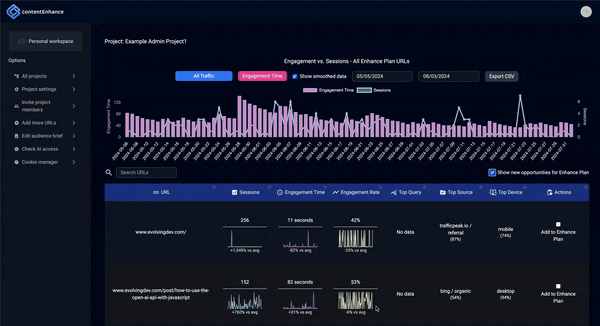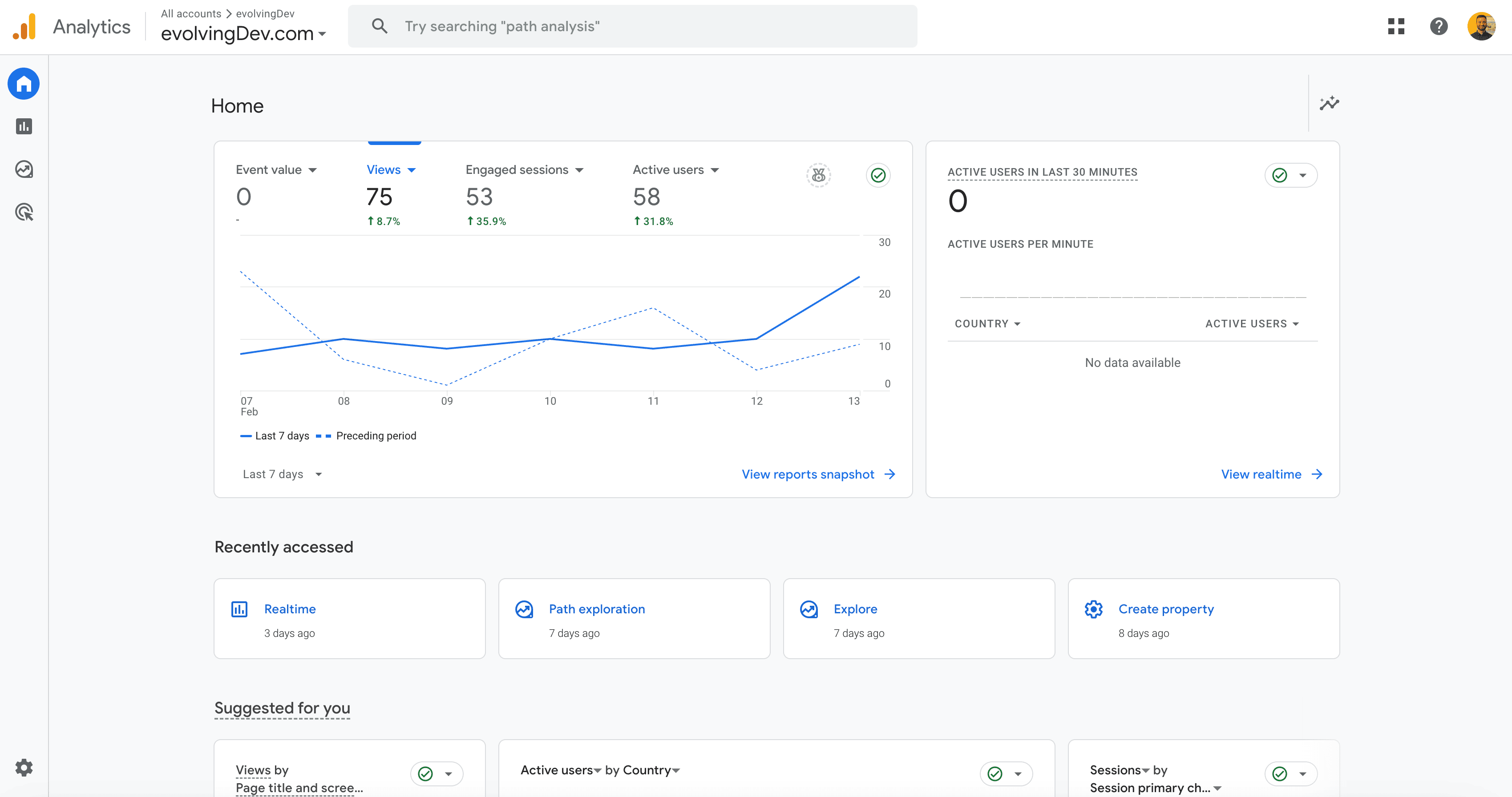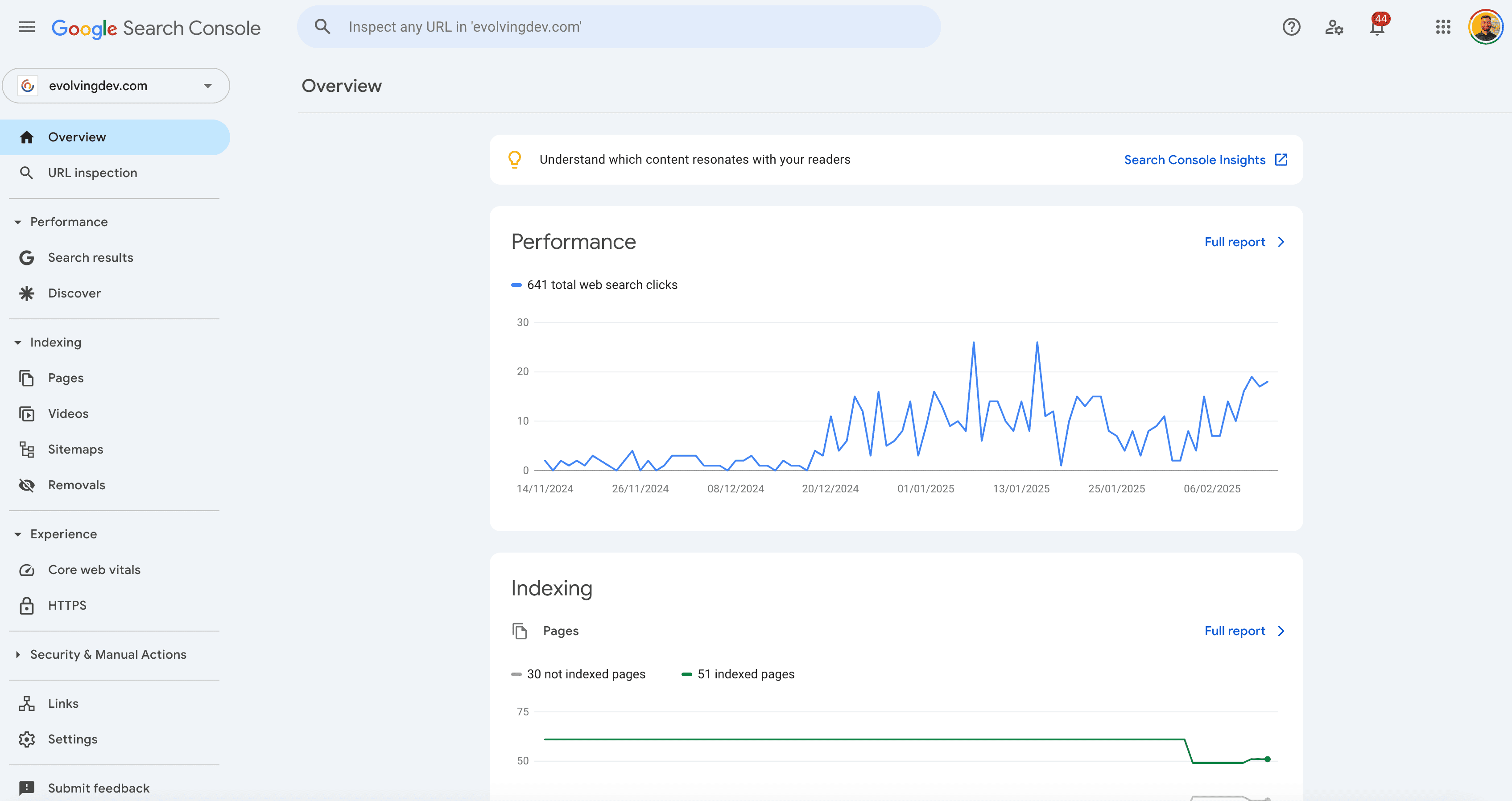THE COMPLETE GUIDE
GA4 vs GSC: The Essentials
Google Analytics 4 (GA4) and Google Search Console (GSC) are two essential tools for understanding website performance, but they serve different purposes and can be challenging for content teams to use effectively. While GA4 excels at providing detailed user behavior data and conversion tracking, GSC focuses on search performance and technical SEO insights. However, the complexity of GA4 and the limited scope of GSC can make it difficult for content teams to get actionable insights. This is where contentEnhance steps in, combining the best data from both platforms with AI-powered recommendations to help content teams make informed decisions and improvements.
Sign up free
GA4 Background
Google Analytics 4 (GA4) is Google's latest generation of analytics platform, launched in 2020 as the successor to Universal Analytics (UA). It represents a significant shift in how website and app data is collected and analyzed, moving from a session-based model to an event-based one that better reflects modern user interactions across multiple devices and platforms.

Key Differences from Universal Analytics
Event-Based vs Session-Based: While Universal Analytics focused on session-based data, GA4 tracks every interaction as an event, providing more granular and flexible analysis capabilities.
Cross-Platform Tracking: GA4 offers seamless tracking across websites and mobile apps, unlike UA which required separate properties.
Machine Learning Integration: GA4 incorporates advanced machine learning to provide predictive metrics and insights.
Privacy-First Design: Built with privacy in mind, GA4 functions effectively without cookies and provides better data controls.
Installation and Setup
GA4 can be implemented in several ways:
- Google Tag Manager: The recommended method, offering the most flexibility and control.
- Direct Code Implementation: By adding the GA4 tracking code directly to your website.
- CMS Plugins: Many content management systems offer dedicated GA4 integration plugins.
The basic setup process involves creating a GA4 property in your Google Analytics account, installing the tracking code on your website, setting up data streams for each platform (web/iOS/Android), and configuring essential events and conversions.
Cost and Availability
GA4 is free for most users, with generous limits:
- Up to 10 million events per month
- 500 events per session
- 30 conversion events per property
- Data retention of up to 14 months
For enterprises needing more capacity, Google Analytics 360 (the paid version) offers higher limits and additional features.
Limitations
Complex Interface and Learning Curve:
The GA4 interface represents a significant departure from Universal Analytics, requiring substantial time investment to learn. Multiple layers of menus and configuration options can overwhelm new users. Creating custom reports and segments requires advanced knowledge of the platform, and documentation and best practices are still evolving as the platform matures.
Data Collection and Privacy Challenges:
Cookie restrictions and privacy regulations like GDPR affect data accuracy. User opt-outs and ad blockers can create gaps in data collection. Cross-domain tracking requires additional setup and maintenance. Some metrics are modeled or sampled, potentially affecting accuracy.
Technical Implementation Hurdles:
Complex event tracking setup requires development resources. Custom dimensions and metrics need careful planning and implementation. Enhanced measurement features may require additional configuration. Debugging data collection issues requires technical expertise.
Data Retention and Historical Analysis:
Standard accounts are limited to 14 months of historical data. Some report comparisons are restricted to shorter time periods. Data sampling can affect historical analysis accuracy, and there's limited ability to import historical data from other platforms.
Strengths
Advanced Event Tracking:
Automatically tracks many common user interactions. Custom events can be created for specific business needs. Enhanced measurement provides detailed interaction data. Event parameters offer granular analysis capabilities.
Machine Learning Capabilities:
Predictive metrics for user behavior and conversions. Automated insights highlight significant changes. Advanced audience targeting capabilities. Anomaly detection and smart reporting features.
Cross-Platform Analytics:
Seamless tracking across websites and mobile apps. Unified reporting for multiple platforms. Device-agnostic user journey analysis. Consistent measurement across different properties.
Privacy-Centric Design:
Built to function effectively without third-party cookies. Flexible consent modes for different privacy requirements. IP anonymization and data controls. Compliance-friendly data collection options.
Real-Time Analysis:
Immediate visibility into user behavior. Live monitoring of conversion events. Real-time report customization. Instant verification of tracking implementation.
Integration Capabilities:
Native integration with Google Ads and other Google products. BigQuery export for advanced analysis. API access for custom reporting solutions. Connection to various third-party platforms.
GSC Background
Google Search Console (GSC) is a free web service offered by Google that helps website owners monitor, maintain, and troubleshoot their site's presence in Google Search results. Unlike GA4, GSC focuses specifically on search performance and technical SEO aspects.

Installation and Setup
Setting up GSC is relatively straightforward:
- Property Verification: Add your website as a property in GSC, then verify ownership through methods like HTML file upload, HTML tag, DNS record, Google Analytics tracking code, or Google Tag Manager container snippet.
- Site Configuration: Submit your sitemap (if available), set your preferred domain version, and configure international targeting if applicable.
Cost and Features
GSC is completely free and includes:
- Search Performance Data: Click and impression data, average position, CTR analysis, geographic performance, and device-specific metrics.
- Technical Insights: Mobile usability reports, Core Web Vitals monitoring, index coverage status, security issues detection, and manual actions reports.
- URL Management: URL inspection tool, sitemap submission and monitoring, removal request handling, and page indexing status checks.
You also get 16 months of search performance data, real-time crawl data, and regular performance reports and alerts.
Limitations
Limited Integration Capabilities:
Restricted API access compared to GA4, fewer third-party integration options, and manual data export processes.
Data Accuracy and Verification:
Search data can be delayed by 2-3 days, and there's limited ability to verify data accuracy. For sites with high query volumes, data is often sampled. Discrepancies between GSC and other analytics tools can occur.
Reporting Limitations:
Basic reporting interface with limited customization, no custom report builder, and limited ability to combine multiple data dimensions easily. Exporting large datasets can be cumbersome.
User Management Restrictions:
Basic user permission settings, limited collaboration features, and restricted access controls for large organizations.
Strengths
Comprehensive Search Insights:
Detailed search query performance data, rich keyword insights and trends, geographic and device-specific data, search appearance analysis.
Technical SEO Monitoring:
Real-time crawl status monitoring, comprehensive index coverage reports, mobile usability insights, Core Web Vitals tracking, security issue alerts.
Site Health Monitoring:
Regular site health updates, automated issue detection, clear problem resolution guidance, performance trend monitoring.
Search Enhancement Tools:
Rich results testing and monitoring, structured data validation, AMP performance tracking, URL inspection capabilities.
Content Performance Analysis:
Page-level search performance metrics, click-through rate analysis, search position tracking, and content improvement suggestions.
How contentEnhance Bridges the Gap
Simplified Data Integration:
contentEnhance combines critical data points from both GA4 and GSC, presenting them in an easy-to-digest format specifically designed for content teams. This integration helps identify pages with high traffic but low engagement, making it easier to prioritize content improvements.
Focus on Content Performance:
Unlike the broad scope of GA4 or the search-specific focus of GSC, contentEnhance specifically targets content performance metrics that matter most to content teams:
- Engagement rates
- User journey mapping
- Traffic sources
- Content effectiveness
- Search performance
Example Sessions vs. Engagement Bar Chart
AI-Powered Insights:
While GA4 and GSC provide raw data, contentEnhance takes it further by generating audience-informed optimization ideas, providing specific implementation support, creating actionable tasks from data insights, and tracking the impact of content improvements.
User-Friendly Features:
contentEnhance addresses the complexity issues of GA4 and the limitations of GSC with features like URL prioritization based on traffic and engagement, automated task management, daily content snapshots, impact tracking of content changes, redirect detection, and cookie management.
When to Use Each Platform
GA4 Best Uses:
Deep dive into user behavior, complex conversion tracking, custom event monitoring, advanced segmentation, and e-commerce tracking.
GSC Best Uses:
Search ranking monitoring, keyword performance analysis, technical SEO audits, mobile optimization, and index coverage checking.
contentEnhance Best Uses:
Content performance optimization, user journey improvement, content team collaboration, scaling content enhancements, tracking content impact, and historical content tracking.
Takeaway
While GA4 and GSC are powerful tools in their own right, their complexity and limitations can make them challenging for content teams to use effectively. contentEnhance bridges this gap by combining the most relevant data from both platforms, adding AI-powered insights, and providing a user-friendly interface designed specifically for content teams. This makes it an ideal solution for organizations looking to improve their content performance efficiently and at scale, while maintaining a clear view of both user behavior and search performance metrics.
Choose your plan
Taster
- 1 user
- 1 project
- GA4 and GSC connection
- Import up to 250 URLs per day
- 2 enhance plan URLs including AI recommendations
- Daily metric update & storage for 7 days
- Journey flow visualisation for each URL
- Task manager
- Daily URL snapshots for 7 days
- Task completion annotations
- Automatic redirect detection
- Generate support for 5 recommendations - one off
Individual
- 1 user
- 3 projects
- GA4 and GSC connection
- Import up to 500 URLs per day
- 50 enhance plan URLs including AI recommendations
- Daily metric update & storage forever
- Journey flow visualisation for each URL
- Task manager
- Daily URL snapshots forever
- Task completion annotations
- Automatic redirect detection
- 5 URL substitutions per month
- 5 URL recommendation refreshes per month
- Generate support for 50 recommendations per month
Team
- 5 users
- 10 projects
- GA4 and GSC connection
- Import up to 1000 URLs per day
- 250 enhance plan URLs including AI recommendations
- Daily metric update & storage forever
- Journey flow visualisation for each URL
- Task manager
- Daily URL snapshots forever
- Task completion annotations
- Automatic redirect detection
- 25 URL substitutions per month
- 25 URL recommendation refreshes per month
- Generate support for 250 recommendations per month